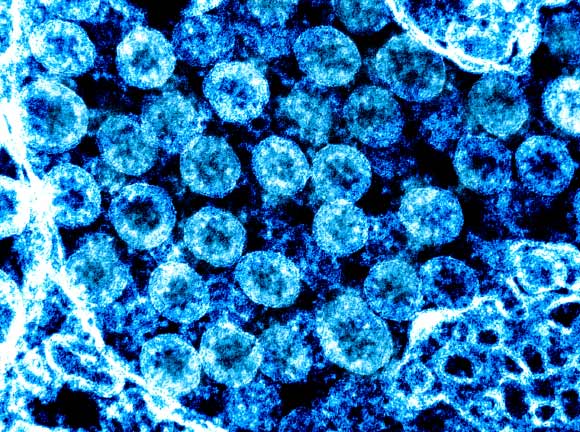Scientists from Gero Pte. Ltd., Singapore, have used a deep neural network to search for host-target acting antivirals among experimental and approved drugs with potential activity against SARS-CoV-2, a novel coronavirus that causes the COVID-19 disease.

Transmission electron micrograph of SARS-CoV-2 virus particles, isolated from a patient. Image credit: NIAID.
“We used our AI drug discovery platform to identify molecules with potential effects on the coronavirus replication,” the researchers said.
“The fact that this time the potential treatments were found among the existing drugs marks a significant improvement over previous efforts to use AI to predict molecules active against COVID-19.”
“The discovery makes it possible to start clinical trials in a matter of weeks.”
“Some of the drugs have been well known for decades and approved in many countries for human or veterinary use, some of them even have confirmed effects against SARS-CoV and SARS-CoV-2 viruses, while others have not been known previously for any related effects.”
The candidate drugs identified by the team include:
(i) Niclosamide, an oral anthelmintic drug used to treat parasitic infections in millions of people worldwide; niclosamide has been approved in Italy, the United States (now withdrawn), France, and some other countries;
(ii) Nitazoxanide, a broad-spectrum antiparasitic and broad-spectrum antiviral prescription drug that is used in medicine for the treatment of various helminthic, protozoal, and viral infections; approved in the U.S., India, Mexico and some other countries;
(iii) Afatinib, a prescription medicine approved in the U.S. for the treatment of patients with metastatic non-small cell lung cancer (NSCLC), along with 28 countries within the EU, China, and some other countries;
(iv) Ixazomib, a prescription medicine used in combination with the medicines REVLIMID® (lenalidomide) and dexamethasone to treat multiple myeloma in patients who have received at least one prior treatment for their multiple myeloma; approved in the United States, the EU and some other countries;
(v) Reserpine was originally isolated from the flower Rauwolfia serpentina in 1952; it was once used as a treatment for high blood pressure and psychotic episodes; it has been approved in Italy, Germany, France and some other countries.
The list of potential anti-COVID-19 drugs also includes several senolytics, molecules that kill the so-called senescent (damaged) cells.
They are attracting the growing interest from the academic world and the biotech industry for their potential against a range of age-related diseases and ageing itself.
“Although some of the drugs with anti-coronavirus potential have been approved for use on humans for other medical indications and are immediately available to the public, we strongly urge against self-treatment and reaffirms the necessity of acting in line with the national regulations, including the rules for off-label use of available drugs,” the study authors said.
Their paper was published online on the Researchgate.net server.
_____
Konstantin Avchaciov et al. 2020. AI for the repurposing of approved or investigational drugs against COVID-19. Researchgate.net, doi: 10.13140/RG.2.2.20588.10886
This article is based on text provided by Gero Pte. Ltd. It does not endorse drugs or recommend therapy. This information is for the purpose of initiating collaborations for further research of identified compounds. The absence of a warning for a given drug or combination thereof should not be in any way construed to indicate safety, effectiveness, or appropriateness for any given patient.







